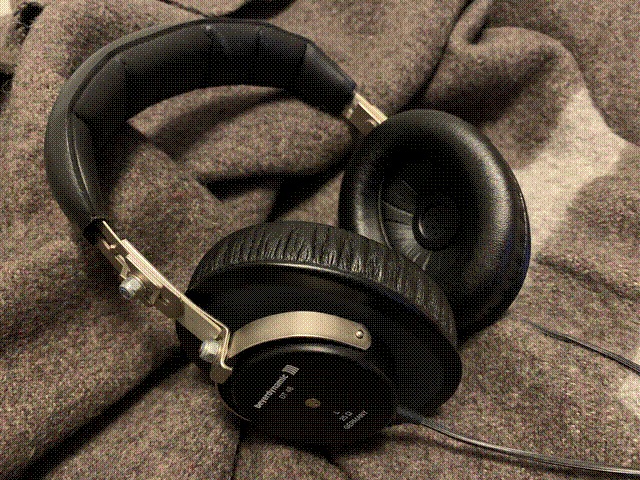╔═════════════════════════════════════════╗ ║ ▄▄ ▄▄ ▄▄▄ ▄▄ ║ ║ █▀█ ▀▀██ ▄ ▄▄ ▀█ ▀▀█ ║ ║ █ ▄██▄ ██▀ █ ▄██ ▀█ ▄█▄▄ ▄██ █▄██ ║ ║ ▄█ █▄█▀ █▀ █ ▀ █ █ █▀ █▀ ██ █ ║ ║ ▄█▀█ ▀█▄▄▄▀█▄▄ █ ██▀█▀ █▄▄█ █▄▄ █ █ ║ ║ ▀█▄█ ▀▀▀ ██▀ ▀▀ ▄ ▀▀▀ ▀ █▄ ║ ║ ▀ ▀▀ ║ ╚═════════════════════════════════════════╝
a rather recent addition to my collection, and has grown to be one of my favorite closed-back headphones, is the beyerdynamic dt48. the dt48 model name has been around since 1937 and were the first ever headphones to feature dynamic drivers. there have been several improvements since then, but retains the same style driver-- an inverted aluminum dome that has almost no excursion. afaik, the main acoustical improvement over the decades have been the earpads, rather than the driver tuning itself. the dt48 series were discontinued in the early 2010s, 2011 or 2012 to be more precise. i have the most recent version of the dt48, but the internet tells me that putting the most recent iteration of the earpads on a pair of dt48 from the 70s or 80s will yield me a very similar sound, if not the same.
how do they sound? pretty neat. they're the most midrange-centric headphones i've ever heard. bass slam is essentially non-existent, and a good portion of the treble is rather muted. this may hint to you that it sounds like you're listening to music on a telephone, or perhaps am radio, but this really isn't the case. there's a bit more fidelity than that, there's some air retained in the treble to keep it from sounding too closed in, in a narrow-banded way.
if i were to describe the dt48 sound signature using one word, i'd probably go with 'dehydrated'. having almost no weight in the bass, coupled with the muted portions of the treble, leaves you with an extremely clean, detailed, and dynamic sounding midrange. the sound signature may come off as rather harsh-sounding to a lot of people, as midrange is very focused with almost no seasoning provided by the highs or lows.
this above sound description makes sense, though, because beyerdynamic's main intentions for the dt48 were for use in field recording, localization, audiometry, or perhaps vocal monitoring if used for something music-related. a euphonophile who prioritizes vocals/vocal texture would find these headphones to bring about an interesting experience, and midrange-focused instruments like guitars and synths sound awesome as well, in my opinion.

the model i own is more specifically known as the dt48e. the most recent versions of the dt48 were the dt48e and dt48a. the dt48a feature colored earcup plates (red for right channel, blue for left), and were marketed for audiometry use. i'm pretty sure the dt48a are the same as the dt48e with the addition of better driver matching. i do have a pair of great condition dt48a on the way that i found for around $85 excluding international shipping. the dt48a is often listed for $250+ because of it being a rather rare headphone, despite it being on the more niche side for headphone collectors.
more commonly, you can find a great/mint condition dt48e in the $50-75 price range, and even cheaper if looking into one of the older iterations. if committed to buying a pair, you'll want to get the modern 'edt 48s' earpads, if the ones being listed don't have them. this can be a deal killer, particularly if you're located outside of europe (~$20 via thomann.de, but also another $20 or so in shipping to usa).
also worth mentioning that the dt48 are built like a tank, especially the headband. loosening and tightening a locknut is required for adjusting the headband, there's no wimpy/fragile plastic adjustment block that can fail just by looking at it the wrong way. if you think beyer's dt770/880/990 pro/studio headphones are built in a similar fashion, the dt48 will make you rethink that.
--
bix